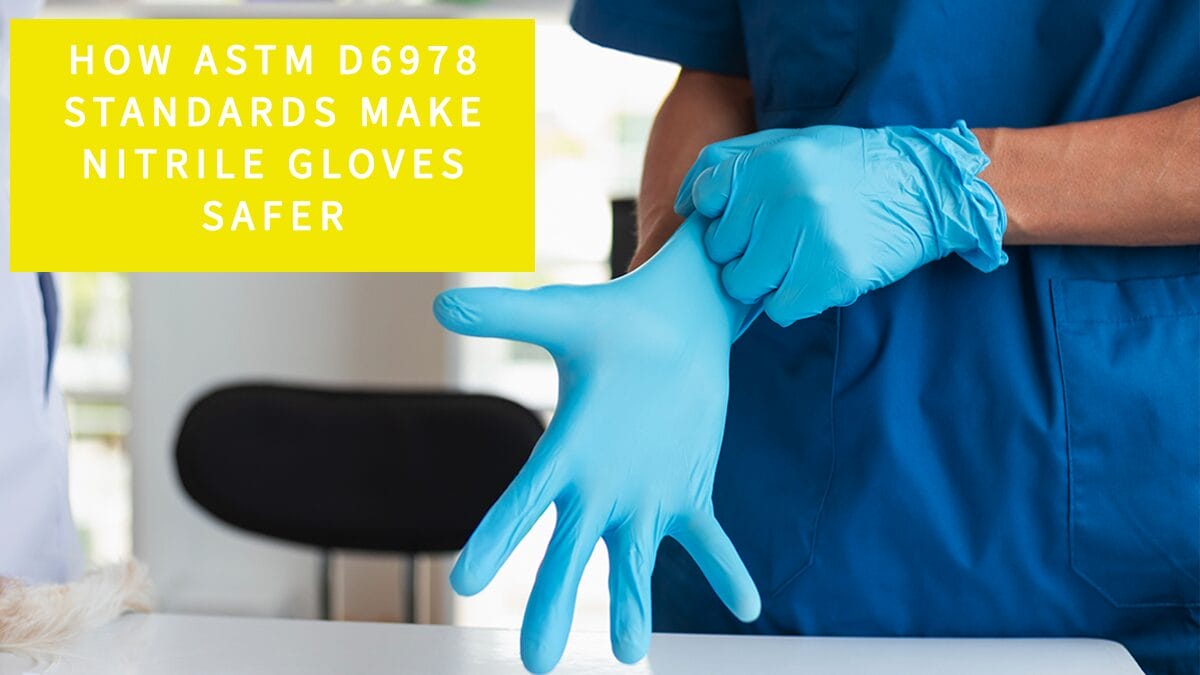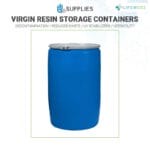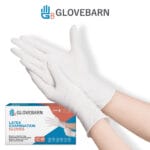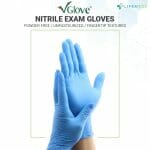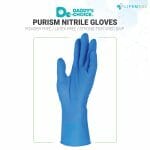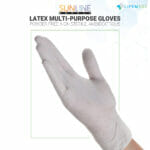In the fast-paced world of healthcare, safety is paramount. The hands that heal and save lives also need protection. Enter nitrile gloves, a crucial barrier between healthcare professionals and potential hazards. However, not all nitrile gloves are created equal. The ASTM D6978 standards are the unsung heroes, ensuring these gloves provide the best protection against chemotherapy drugs and other harmful substances. This blog will explore how these standards enhance the safety of nitrile gloves and why they matter to healthcare professionals and safety equipment buyers.
The Growing Importance of Nitrile Gloves
Nitrile gloves have become the gold standard in various industries, particularly healthcare. Their popularity stems from their superior chemical resistance, durability, and hypoallergenic properties compared to latex gloves. This section will explore why nitrile gloves have become indispensable in medical settings and beyond.
Nitrile gloves are crafted from synthetic rubber and offer excellent resistance to punctures and chemicals. This makes them ideal for handling medications and chemicals often used in medical treatments and laboratory work. With healthcare environments becoming increasingly complex, nitrile gloves provide a reliable shield against a broad spectrum of substances, ensuring the safety of both patients and healthcare providers.
The need for hypoallergenic solutions has driven the transition from latex to nitrile. Many individuals suffer from latex allergies, which can cause severe reactions. Nitrile gloves eliminate this concern, offering a safe alternative without compromising protection. They are now a staple in hospitals, clinics, and labs, highlighting their critical role in maintaining health and safety standards.
Understanding ASTM D6978 Standards
While nitrile gloves are inherently protective, not all gloves offer the same level of protection against specific hazards, particularly chemotherapy drugs. The ASTM D6978 standards come into play here, setting the benchmark for gloves’ resistance to permeation by hazardous drugs.
ASTM D6978 is a rigorous testing standard developed by the American Society for Testing and Materials. It evaluates how well gloves can resist permeation by chemotherapy drugs and other hazardous substances. This standard is crucial because it provides a clear, measurable way to assess the effectiveness of gloves, ensuring that healthcare professionals are adequately protected when exposed to these substances.
Nitrile gloves that meet the ASTM D6978 standards undergo extensive testing to ensure they can withstand the demands of medical environments. This includes exposing the gloves to various chemotherapy drugs and measuring how long these substances take to permeate the glove material. The results offer healthcare professionals peace of mind, knowing their protective gear meets the highest safety benchmarks.
Why ASTM D6978 Matters in Healthcare Settings
Exposure to drugs and chemicals is a daily occurrence in healthcare environments. While nitrile gloves provide a barrier, ASTM D6978 ensures this barrier is robust enough to protect against specific hazards like chemotherapy drugs, which can be particularly harmful.
The standards set by ASTM D6978 are vital in ensuring gloves offer the necessary protection in high-risk settings. This is particularly important for oncology nurses and pharmacists who handle chemotherapy drugs regularly. The standards provide a guideline for manufacturers to produce gloves that can withstand exposure to these potent substances, significantly reducing the risk of permeation and exposure to healthcare workers.
Adhering to ASTM D6978 standards also means that healthcare facilities can maintain compliance with safety regulations. Regulatory bodies often require gloves used in chemotherapy and other sensitive applications to meet specific safety standards. By choosing gloves that adhere to the ASTM D6978 standards, healthcare institutions demonstrate their commitment to worker safety and regulatory compliance.
The Science Behind ASTM D6978 Testing
ASTM D6978 testing involves a series of rigorous procedures designed to evaluate the permeation resistance of gloves when exposed to hazardous drugs. Understanding these procedures is essential for healthcare professionals and safety equipment buyers to appreciate the level of protection provided.
The testing involves exposing the glove material to chemotherapy drugs and measuring the rate at which these drugs penetrate the material. Factors such as glove thickness, material composition, and contact time are considered, providing a comprehensive assessment of the glove’s protective capabilities. This meticulous approach ensures that only gloves meeting the highest safety criteria make it to market.
One critical aspect of the ASTM D6978 testing is its focus on real-world conditions. The tests simulate scenarios healthcare professionals might encounter, offering a practical evaluation of the glove’s performance. This real-world application is invaluable in ensuring that the gloves can withstand the demands of medical settings, where the stakes are incredibly high.
How Nitrile Gloves Meet ASTM D6978 Standards
Nitrile gloves must undergo thorough testing and quality control measures to meet the ASTM D6978 standards. This section will explore how manufacturers design and test their gloves to ensure compliance with these critical standards.
Manufacturers begin by selecting high-quality nitrile materials known for their chemical resistance properties. They then produce gloves with precise thickness levels, balancing flexibility and protection. During production, strict quality control measures ensure that each glove meets the required specifications, eliminating defects that could compromise safety.
Once manufactured, the gloves undergo ASTM D6978 testing, exposing them to various chemotherapy drugs. Only gloves that demonstrate high resistance to permeation pass the test, ensuring that healthcare professionals receive products that provide the necessary protection. This rigorous process is crucial for maintaining the integrity of the gloves and safeguarding those who rely on them daily.
The Benefits of Choosing ASTM D6978-Certified Gloves
Gloves certified to meet ASTM D6978 standards offer numerous benefits to healthcare professionals and safety equipment buyers. This section will highlight why choosing certified gloves over uncertified options is crucial for safety and peace of mind.
Healthcare professionals who choose ASTM D6978-certified gloves can work confidently, knowing they have an effective barrier against hazardous drugs. This is especially important for those handling chemotherapy drugs, where exposure can have serious health implications. Certified gloves ensure that healthcare workers are adequately protected, allowing them to perform their duties without fear of exposure.
For safety equipment buyers, ASTM D6978 certification is a mark of quality and reliability. It assures that the gloves they purchase are subjected to rigorous testing and meet the highest safety standards. This peace of mind is invaluable, especially in industries where safety is a top priority.
Addressing Common Concerns About Nitrile Gloves
Despite their widespread use, nitrile gloves are sometimes met with skepticism and misconceptions. This section will address common concerns and clarify why these gloves, particularly those meeting ASTM D6978 standards, are a trustworthy choice.
A common concern is whether nitrile gloves can provide the same skill and comfort as latex gloves. While nitrile gloves may feel slightly different, advancements in manufacturing have significantly improved their flexibility and fit. Modern nitrile gloves are designed to provide excellent tactile sensitivity, making them suitable for tasks requiring precision.
Another concern revolves around the perception that nitrile gloves are more expensive than other options. While the initial cost may be higher, nitrile gloves offer better durability and chemical resistance, reducing the need for frequent replacements. In the long run, this translates to cost savings while ensuring superior protection.
Exploring the Range of Applications for Nitrile Gloves
Nitrile gloves are not limited to healthcare settings. Their versatility makes them suitable for many applications, from laboratories to industrial environments. This section will explore the diverse uses of nitrile gloves and how they meet the demands of various industries.
Nitrile gloves protect against hazardous chemicals and biological agents in laboratories. Their resistance to a wide range of substances makes them ideal for handling samples and conducting experiments. Additionally, their durability ensures they can withstand the intensive use often required in lab environments.
Nitrile gloves protect workers from oils, solvents, and other potentially harmful substances in industrial settings. Their puncture resistance is particularly valuable in environments where sharp objects are present. This versatility highlights nitrile gloves’ importance in maintaining safety and hygiene across various sectors.
Keeping Up with Advances in Glove Technology
The glove technology landscape is continually evolving, driven by the need for enhanced safety and performance. This section will explore the latest advancements in nitrile glove technology and how they benefit healthcare professionals and safety equipment buyers.
Recent advancements include glove thickness and texture improvements, which enhance grip and tactile sensitivity. These innovations ensure that healthcare professionals can perform delicate tasks precisely while enjoying the protection of nitrile gloves. Additionally, new formulations prioritize sustainability, reducing the environmental impact of glove production.
Technological advancements are also making gloves more accessible to a broader audience. With increased production efficiency, nitrile gloves are becoming more affordable without compromising quality. This accessibility ensures that healthcare professionals and buyers of safety equipment can access top-tier protective gear.
The Future of Safety Equipment
The demand for safer, more reliable protective equipment will grow as industries evolve and new challenges arise. This section will examine the future of safety equipment, focusing on nitrile gloves and the role of ASTM D6978 standards in shaping this landscape.
Even more advanced materials and technologies will likely be integrated into glove production in the future. Smart gloves with sensors and data-gathering capabilities may become a reality, providing real-time feedback on glove conditions and potential hazards. These innovations will further enhance worker safety and efficiency.
While nitrile gloves will remain a staple in safety equipment arsenals, the emphasis on standards like ASTM D6978 will remain crucial. These standards guide manufacturers in producing gloves that meet the highest safety requirements, ensuring that healthcare professionals and workers in other industries have access to reliable and effective protective gear.
Choosing the Right Gloves for Your Needs
With numerous options available, selecting the right gloves can be daunting. This section offers practical tips for healthcare professionals and safety equipment buyers on choosing gloves that meet their specific needs while adhering to ASTM D6978 standards.
When selecting gloves, consider the tasks and substances involved in your work. For healthcare professionals handling chemotherapy drugs, selecting gloves tested and certified to meet ASTM D6978 standards is essential. This ensures that the gloves provide the necessary protection against these hazardous substances.
Additionally, consider factors such as glove size, thickness, and texture. Proper fit and feel are crucial for comfort and dexterity, allowing you to perform tasks precisely and easily. Engage with manufacturers or suppliers to obtain samples and conduct trials, ensuring you find gloves that meet your safety and performance requirements.
Conclusion
Nitrile gloves and ASTM D6978 standards provide an essential layer of protection in healthcare and other high-risk environments. Healthcare professionals and safety equipment buyers can make informed decisions to safeguard themselves and others by understanding the significance of these standards and the benefits of certified gloves. The landscape of safety equipment is evolving, and nitrile gloves remain at the forefront of innovation, offering reliable protection in an increasingly complex world. If you’re serious about safety, explore certified nitrile gloves; contact us today to ensure you’re fully protected for the challenges ahead.

